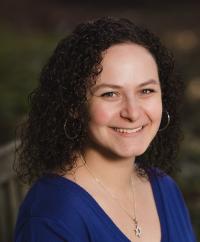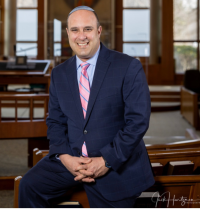Careers in Jewish Studies
Jewish studies majors develop many skills valued by employers including critical thinking, research, writing, problem-solving, communication, language skills, and interpersonal skills.
Undergraduates completing a degree in Hebrew and Jewish Studies have many exciting career opportunities open to them. Majors and minors in Hebrew and Jewish Studies are broadly prepared for any position that requires a bachelor’s degree in the arts, humanities, or social sciences. Some careers include academic advisor; archivist; artist; college professor; communication associate; copywriter; cultural consultant; director of Jewish life and learning; director of Jewish student life; director of programming; director of outreach; director of research; director of social media; editor; events coordinator; grant writer; historian; international aid worker; journalist; legislative and policy analyst; librarian; marketing; preschool, elementary, middle, and high school teacher; rabbi; religious school educator; social worker; synagogue organizer; translator; and many more.
Majors are also well prepared to apply for graduate studies in fields such as law, education, history, literature, the arts, social work, business, and community work, as well as prime candidates for rabbinical or cantorial school, theological studies, and advanced levels of Jewish studies.
There are additionally many exciting careers in the Jewish community for which an undergraduate Hebrew and Jewish Studies degree is excellent preparation. These include jobs at Jewish community centers, federations, national and international Jewish organizations, Israel support organizations, Jewish education (including day and supplementary school), Jewish day and overnight camps, synagogue administration, youth group advising, and work with the elderly, to name a few. The demand for motivated employees is very high, and our students have made successful careers in many of these fields.
Hear about careers from our alums!

Tell us about your job.
I am the Community Research and Grants Management Administrator at The Columbus Foundation. We are a large community foundation whose mission is strengthening and improving our community for the benefit of all its residents. I oversee the administration of our Nonprofit Directory, the crowdfunding platform "Better Together," Capacity Building programming, and the Summer Fellowship Program, among other responsibilities.
Why did you choose to study Jewish studies?
I was a Hebrew school nerd as a kid and have always loved learning about and experiencing Judaism. Throughout high school, I was active in my youth group (USY) both locally, nationally, and internationally. I continued my Jewish journey on a gap year program in Israel, eventually ending up at OSU. In addition to the large number of fascinating courses, there were travel opportunities that I was able to take advantage of as well. The Melton Center has one of the top Jewish Studies programs in the country, and I felt so fortunate to be able to participate in such a prestigious program so close to home.
How did the major and minors affect your career choices?
I chose to major in Jewish Studies with minors in Jewish Oral History, and Nonprofit Studies. The courses I was able to take allowed me to focus on specific areas of interest that led me to begin my planned career in the Jewish nonprofit world. I am now honored to serve the Jewish community on several boards, including Young JewishColumbus, Congregation Torat Emet, and The Columbus Jewish Historical Society--all of which I was more prepared for because of the classes I took through The Melton Center.
How did Jewish studies courses and scholarships help you become the professional that you are today?
Through Melton Center scholarships, I was able to fund part of my undergraduate education, as well as travel to Vilnius, Lithuania to study Yiddish over the summer. This once-in-a-lifetime opportunity allowed me to learn European Jewish history up close and personal, and meet like-minded Yiddish culture lovers from around the world--some of whom I still keep in touch with today. I recently began a Master's degree program in Jewish Professional Studies at Gratz College as well, and I feel more than prepared to excel due to the rigorous courses I took at OSU.
What advice would you offer to students considering a major in Jewish studies?
Get to know the staff and faculty at the Melton Center, as they are some of the most brilliant minds in the field and have so much knowledge to share. Consider combining the major with other areas of interest to expand your educational and professional opportunities. Connect with people in the Greater Columbus Jewish community outside of OSU—many of us would love to be a resource for you (myself included)!

Rabbi Adam Raskin
Class of 1996
Jewish studies major
Tell us about your job.
I am the senior rabbi of a vibrant, 700-family Conservative synagogue in the Maryland suburbs of Washington, D.C. I oversee a staff of clergy, educators, and youth professionals, a five-day-a-week early childhood center, a supplemental religious school program, and a palate of adult Jewish learning, family programming, and religious services. I am also active in the larger Washington, D.C. Jewish community, and as a representative and advocate for Jewish causes in the larger community. I have been here for 13 years, and before that, I was a rabbi in Dallas, TX.
Why did you choose to study Jewish studies?
I felt drawn to serve the Jewish community from an early age. Most of my Jewish education before college was either in supplemental programs (Hebrew school) or informal (camps, youth groups, Israel trips). I was aware of an absence of serious, academically rigorous Jewish studies and I wanted to immerse myself in an interdisciplinary program that would provide the depth and sophistication I was seeking.
How did the major affect your career choices?
The more I learned, the more I wanted to teach and share the richness of Jewish civilization. When I tell people that I attended Ohio State as an undergrad, they almost say something about the tremendous size of the university. But then I explained that Jewish studies were an amazing, nurturing community within the school, where I had meaningful relationships with professors and seminar-style classes that created a wonderful rapport with other students and scholars. As a result, I was able to refine my aspirations for further study and my career with people who knew me, and whom I considered mentors.
How did Jewish studies courses and scholarships help you become the professional that you are today?
I entered graduate school and seminary with a solid grounding in Jewish philosophy, ancient and modern Jewish history, Biblical and Rabbinic literature, and Hebrew language. This was indispensable to my success at the Jewish Theological Seminary, where I was honored to be a Wexner Graduate Fellow. I attribute so much of my preparation and inspiration for future study to my professors at Ohio State.
What advice would you offer to students considering a major in Jewish studies?
Perhaps the most invaluable aspect of being a Jewish Studies major is access to world-class scholars. I would encourage Jewish studies students to not only take advantage of the wide array of course offerings but also use the opportunity to get to know their professors. As much as I learned from them in the classroom, I also benefitted (and continue to benefit) from their expertise and guidance outside the classroom. Go to speak with professors during office hours. Attend special lectures and events at the Melton Center. Offer to help professors with their research. Take advantage of opportunities to speak with them about their fields and interests. Many years after graduating, one of my proudest moments was inviting Dr. Tamar Rudavsky, my Jewish philosophy professor and major advisor to my synagogue as scholar-in-residence!

